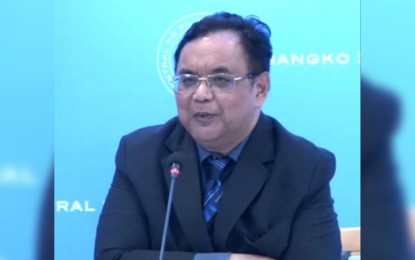
BSP Deputy Governor Francisco Dakila Jr. (PNA photo by Joann Villanueva)
MANILA – A ranking official of the Bangko Sentral ng Pilipinas (BSP) said on Friday he continues to see a within-target inflation rate for 2020 and 2021 despite risks from the volatility of international oil prices and rice supply, among others.
BSP Deputy Governor Francisco Dakila Jr., in a briefing for the fourth quarter 2019 Inflation Report in Manila, said members of the policy-making Monetary Board (MB) will be looking at several data such as the fourth quarter and full-year 2019 gross domestic product (GDP) and developments of global oil prices, among others, on their first policy meeting for the year on February 6.
He noted that the faster domestic output in the last quarter of last year, at 6.4 percent from quarter ago's 6 percent, is “quite favorable.”
“It brings us back quite close at least to the lower end of the government target and it places us in a more comfortable position with respect to the target growth for 2020,” he said.
The government’s 2019 gross domestic product (GDP) target is a range between 6-6.5 percent while it is 6.5-7.5 percent for 2020-22.
Dakila said the MB will also be considering the December 2019 inflation figure, which rose to 2.5 percent from 1.3 percent in the previous month.
Average inflation in 2019 stood at 2.5 percent, within the government’s 2 to 4 percent target band.
The central bank official said the latest GDP and inflation reports “will impact on the assessment of the baseline inflation path.”
“As you know the latest path that we give out to the public following the policy decision (last December) showed (an average inflation forecast of) 2.9 percent for 2020 and likewise 2.9 percent for 2021,” he said.
Dakila noted that based on current figures the baseline inflation has “ample cushion for the achievement of the inflation target for both years in the policy horizon.”
“So even when we look at the impact of the various risks that have been identified, this still brings us to within the target band,” he said.
With regards to the impact of the volatile global oil prices and the supply issues of rice from Thailand, which is among the sources of Philippines’ imported rice, Dakila said these along with the two earlier factors will be assessed during the Board’s rate-setting meet next month.
He said the latter two factors “may come in in the risk matrix depending on the judgment of whether they are turning out to be significant factors or they may not, at the time the Board makes the decision.”
Thailand is currently experiencing drought which triggered fears of supplies running short, which in turn, resulted in an uptick of prices. (PNA)
